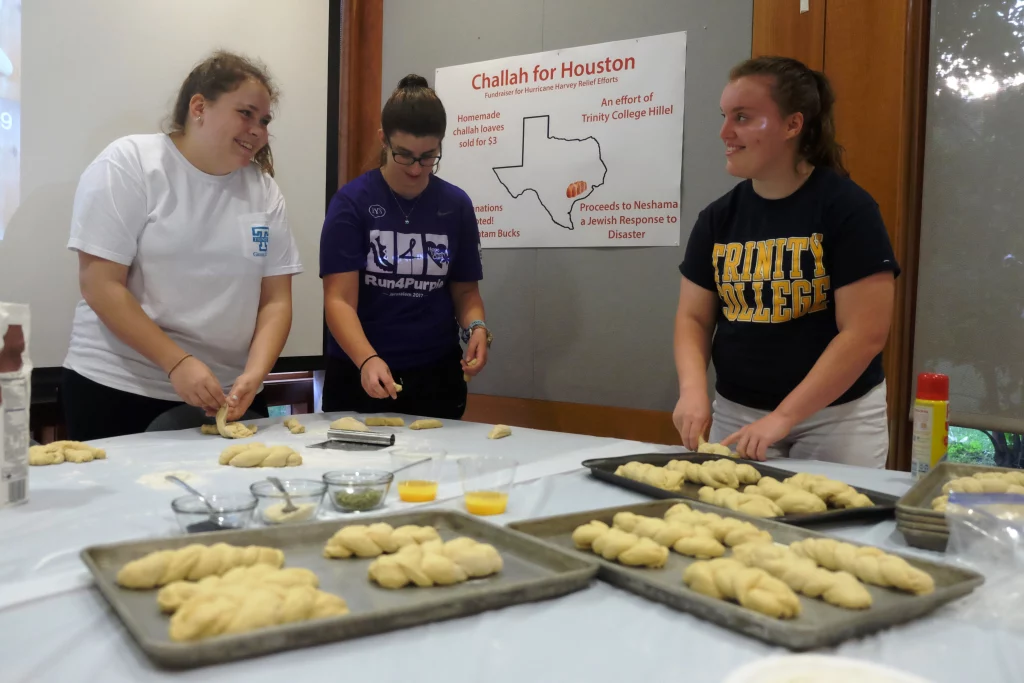Baking Braids for a Good Cause

Home is where the heart is—or where the challah is.
Matthew Kritz, a rising senior at Princeton University, grew up making challah at home. Now, he’s president of the local chapter of Challah for Hunger.
A national organization that bakes and sells challah, donating the profits to social justice causes, Challah for Hunger now has chapters on more than 80 campus Hillels. Half of the proceeds go to MAZON: A Jewish Response to Hunger, while the other half goes to charities of students’ choosing. To date, the organization has donated more than $1 million to fight hunger near campus and around the world.
“Certainly for me and a lot of other students, it’s a nice way not only to give back to the community, but also to feel a little bit more at home when you’re away on campus,” Kritz says.
He joins his fellow undergrads Thursdays after class to braid the dough and bake it into loaves—all of their challah is vegan, too, simply by removing the eggs—which are ready to sell by Friday morning.
At $5 apiece, they usually sell about 100 loaves, earning an estimated $500 a week.
Connecting to Shabbat, family, the Jewish community and others in need are important values for Kritz, and they all fall under the umbrella of Challah for Hunger and Hillel, he points out.
“Whether the Princeton Hillel likes it or not, I sort of see it as my living room,” he explains. “I see it as a space where I see people I know, where I feel comfortable, where I feel like I have a community.”
Brenna Rosen, a rising junior at the University of Pittsburgh, says Challah for Hunger gives her a creative outlet.
She’ll be assuming the role of president this fall for the chapter, which often bakes 15 trays of bread each week. They amassed 1,700 challahs, averaging $5,000, last year.
With three baking managers on board, they create different flavor concoctions, like tomato pesto or chocolate babka.
Prior to college, Rosen never made challah. Last summer, she taught her mom how to make it for the first time.
“It’s fun to take that tradition from school and bring it home,” says Rosen. “It’s usually vice versa.”
Maya Lubarsky, a rising senior at the University of Miami, recently joined the national board of Challah for Hunger as a student representative. She helped start the UM chapter about three years ago, later taking on acting treasurer and president roles. This year, she took a step back to let others take the local lead.
They bake, on average, 70 challahs a week, taking in roughly $3,500 each year. Half of the proceeds go to the Kosher Food Bank in Miami.
“It’s a lot of hands-on volunteering,” says Lubarsky. “It really means a lot to me to just get a different perspective on my community … to be able to take a little bit of time out of my week and give to people who may not be able to help themselves.”
Beyond the charity, Lubarsky loves working with the people.
“The people that Challah draws [are] really dedicated people who care about their community, who care about different organizations and who are passionate about making the change,” she says.
Coming into college, she strayed from any Jewish campus organization. That was before Hillel.
“From going from wanting nothing to do with this to spending maybe 15, 20 hours a week at minimum on this club, and now sitting on the national board,” she says. “Food brings people together. We’re breaking bread and we’re opening new ideas and we’re forging new paths to end hunger.”